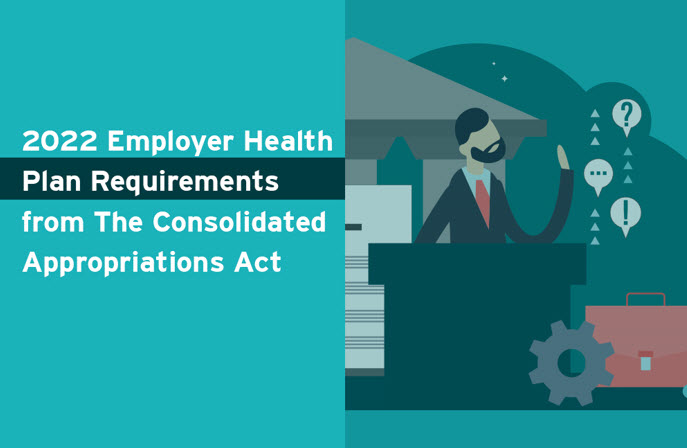
2022 Employer Health Plan Requirements from The Consolidated Appropriations Act
Employer health plans have new requirements due to provisions from The Consolidated Appropriations Act. The continual rise of health care costs have sparked the bi-partisan price transparency regulations for health care providers, third-party administrators, and now health plans. One of the biggest changes is the No Surprises Act, part of the Consolidated Appropriations Act, which bans surprise medical billing.
No Surprises Act
There are five basic patient protections provided by the No Surprises Act, which goes into effect on January 1, 2022:
- Protects against balance-billing and out-of-network cost sharing for ER services, non-emergency services by out-of-network providers at in-network facilities, and out-of-network air ambulance providers.
- Prohibits certain balance-billing by providers
- Require disclosure of federal and state patient protections against balance-billing
- Recodify certain patient protections of the ACA and apply them to grandfathered health plans
- Create compliant and audit processes for violations of these protections
In addition to the No Surprises Act, the Consolidated Appropriations Act also outlines other future employer health plan requirements. We were joined by Quarles & Brady’s John Barlament to run through those obligations, their enforcement dates, their impact on employers, and what employer health plans can do to prepare for compliance with them. (For a more detailed analysis of your CAA obligations, view the entire webinar presentation here.)
Consolidated Appropriations Act Employer Checklist
The following CAA “checklist” was furnished by John Barlament and has been edited and shared here with his permission:
Removal of Gag Clauses
Effective Immediately
Employer health plans cannot enter into agreements restricting the disclosure of certain information relating to cost and quality. Plans must submit to an annual “attestation” to show they are compliant with the requirements.
The Alliance has already taken action in this area by reviewing existing contracts to include specific language reflecting the changes.
Advice for Employers:
- Monitor future developments for more guidance on how to submit annual attestation.
Broker and Consultant Compensation Disclosure
Effective December 27, 2021
Brokers and consultants must disclose certain compensation they receive for consulting and brokerage services if the amount exceeds $1,000. They must also disclose indirect compensation such as commissions. If there is an error within the disclosure, they must correct it within 30 days. There is no clarification yet on exact scope of entities covered.
Advice for Employers: Lack of guidance makes analysis difficult at this point, but employers could analyze their contracts.
Medical and Drug Cost Reporting
Likely December 27, 2022 per HHS’ ACA FAQ Part 49. (Previously Effective December 27, 2021.)
Employer health plans must report certain information to the federal government related to prescription drugs. Report will be periodic and ongoing, although there has been no clarification yet on details of the reporting process.
Advice for Employers:
- Discuss with vendors if they will be conducting the reporting.
- If so, verify cost and contractual terms and reflect the same in contractual amendment. (Note that lack of guidance may result in vendors being uncertain about whether they will conduct the reporting and the plan’s cost for doing so.
Mental Health Parity and Addiction Equity Act (MHPAEA) Comparative Analysis
Effective February 10, 2021
Employer health plans must prepare and provide a written analysis of how the plan complies with MHPAEA’s rules on nonquantitative treatment limitations (NQTLs) upon request. This includes entities such as Department of Labor (DOL), Health and Human Services (HHS), or certain state agencies.
Advice for Employers:
- Work with vendors to prepare analysis.
- For employers with self-funded, non-federal governmental plans, consider “opting out” of MHPAEA requirements.
Surprise Billing
Effective January 1, 2022
Employer health plans must cover emergency services provided by a non-participating provider/facility without prior authorization and at in-network rates. Patients generally receive protection against balance billing from the provider.
Additionally, health plans must cover non-emergency services provided by a non-participating provider at a participating facility at an in-network rate.
If the provider objects to payment level, the plan and provider will initially negotiate the amount. If there is still no agreement, either may request an Independent Dispute Resolution (“IDR”) process. IDR process generally will result in a binding decision on an amount the plan must pay.
Advice for Employers:
- Work with vendors to ensure that they are complying with rules on behalf of plan sponsor.
- Update vendor contracts to reflect rules and cost (e.g., whether health plan will pay for IDR costs.)
- IDR regulations from October 2021 also provides certain expansions of external review process related to these payments. These are essentially new “rights” for plan enrollees. Therefore, the health plan sponsor should update plan document / SPD for new requirements.
Surprise Air Ambulance Bills
Effective January 1, 2022
Air ambulance bills will be subject to similar rules as the Surprise Billing section above. The intent is to protect plan enrollees for what can be significant air ambulance bills.
Advice for Employers:
- Work with vendors to ensure that they are complying with rules on behalf of health plan sponsor.
- Update vendor contracts to reflect rules and cost (e.g., whether health plan sponsor will pay for IDR costs.)
- IDR regulations from October 2021 also provides certain expansions of external review process related to these payments. These are essentially new “rights” for plan enrollees. Therefore, the health plan sponsor should update plan document / SPD for new requirements.
Reporting Requirements Regarding Air Ambulance Services
Effective 90 days after the final rules are issued.
The health plan sponsor must report certain, detailed air ambulance information to the federal government.
Advice for Employers:
- Verify if vendors (such as your TPA) will conduct such reporting. Modify contracts to reflect new services.
Modify Identification Cards
Effective January 1, 2022
Identification cards now must include additional information relating to deductibles and out-of-pocket maximums.
Advice for Employers:
- Verify if vendor (such as your TPA) will update cards and cost for doing so. Modify contract to reflect new services.
No Discrimination Against Certain Providers
Effective January 1, 2022
The Affordable Care Act contained an unclear provision stating that employee health plans cannot discriminate against providers acting within the scope of their license or certification. The scope of this rule is still unclear under the Affordable Care Act. Future Consolidated Appropriations Act guidance should clarify what is required.
Advice for Employers:
- Monitor for clarifications.
- If necessary, modify plan provisions which could be impacted. (For example, it’s possible that limitations on coverage of midwife services may need to be removed.)
Advanced Explanation of Benefits (“EOB”)
Delayed. Previously Effective January 1, 2022
Employer health plans must provide patients with an advanced EOB for certain services upon request. This will require plans (or the TPA on behalf of the plan) to coordinate with the provider on expected procedures.
Advice for Employers:
- Confirm in writing that the TPA will comply with these rules and if so, the cost. Update the contract to reflect that.
- Once details are known of what new rights enrollees have, modify plan document / SPD to describe the same.
Continuity of Care
Effective January 1, 2022
Employer health plans must continue to cover certain benefits on an in-network basis when a provider or facility ceases to be in-network. Will require COBRA-like provisions, with plan notifying enrollee of right to obtain this benefit and enrollee electing the benefit. Generally applicable for serious and complex (or terminal) medical conditions.
Advice for Employers:
- Confirm the TPA will administer changes and modify the contract to reflect the same.
- Once more guidance is known, amend the plan documents and SPDs.
Price Comparison Tool
Delayed. Previously Effective January 1, 2022
Employer health plans must offer price comparison guidance by phone and a price comparison tool online. The goal is that patients will be able to compare costs for various providers.
This rule overlaps with the November 2020 “Transparency Regulations,” so you should expect future guidance to harmonize the two.
Advice for Employers:
- Monitor for future developments.
Provider Directory and Coverage Information Requests
Effective January 1, 2022
Employer health plans must create a database on a public website that includes a list of providers and facilities that are in-network. Information must be verified and updated every 90 days (to remove providers who have left network.)
If information that plans provide about in-network status is incorrect, the plan enrollee may be protected from higher cost-sharing amounts.
Advice for Employers:
- Confirm the vendor will comply with the rules, then update the vendor contract. (Determining the risk of incorrect information will be the biggest challenge (e.g., will the TPA be responsible if incorrect information is provided to plan enrollee?)
What’s Next?
This condensed blog article is aimed to provide employers, as health plan sponsors, with a high-level recap of upcoming rules and regulations. For a more detailed analysis of Consolidated Appropriations Act and No Surprises Act obligations, you can view the entire webinar presentation here.
The webinar also takes a deeper dive into the following topics:
- HIPAA Changes
- COBRA Clarifications
- ACA Section 1557
- Drug Price Reporting
- Transparency Regulations
- EBSA Cybersecurity
If you are a self-funded employer who wants to make a difference in these and other health policy matters, let us know!
We can walk you through talking points and meetings with your legislators, help you sign on to group letters to key lawmakers, and provide you with more details on joining our Health Policy Committee.








